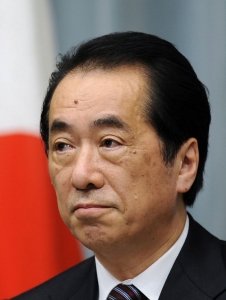
Yoshihiko Noda, the Japan’s new prime minister.
[googlead tip=”patrat_mare”]Naoto Kan, Japan’s Prime Minister resigned on Friday, fulfilling a promise to critics who blasted what they called his befuddled response to the nation’s dual economic and nuclear calamities triggered by the March 11 earthquake and tsunami.
In a nationally televised speech, Japanese PM Naoto Kan announced on Friday that he resigned from his position as leader of the ruling Democratic Party of Japan (DPJ) after only 15 months.
After Naoto Kan long-anticipated resignation, DPJ has to select a new leader until Monday — with the winner almost certainly to become Japan’s prime minister.
Naoto Kan‘s departure, after assuming his post in June 2011 following another Japanese power shakeup, means that his successor will become the Japan’s 6th prime minister since 2006.
PM Naoto Kan had promised he would quit once lawmakers passed three key pieces of post-tsunami recovery legislation, the last two of which cleared parliament Friday.
Naoto Kan, 64, is the former finance minister who entered politics after laboring as a Tokyo civic activist.

He initially held the appeal of an outsider who rose up the political ladder on his own merit, rather than merely inheriting political favor as the son or grandson of an outgoing politician.
PM’s approval rating, already near a historic low, plummeted further after what critics call several blunders following the March 11 earthquake that crippled the Fukushima Daiichi nuclear power plant.
The natural disaster led to the release of deadly radiation into the atmosphere and prompted the evacuation of tens of thousands of nearby residents, many of whom have yet to return to their homes.
A recent poll by Japan’s Kyodo News Agency showed that Naoto Kan’s popularity rating among voters had dropped to just 15.8%.[googlead tip=”vertical_mare” aliniat=”dreapta”]
In the weeks following the meltdown at several reactors at the Fukushima Daiichi plant, critics lambasted Naoto Kan for failing to take charge of the disaster response and leaving too much power in the hands of the Tokyo Electric Power Co., the utility that runs the plant.
Only after the catastrophe Naoto Kan called for alternatives to Japan’s nuclear power policies. While the Kyodo poll showed that 75% of respondents favored a plan to phase out nuclear power, most were determined to be rid of Naoto Kan as well.
Akiko Domoto, a former governor of Chiba Prefecture who worked closely with Naoto Kan within the party said:
“He just didn’t have what it took to be Japan’s top leader.”
“In the party, he did a good job, but as prime minister, he couldn’t talk with the bureaucrats and had little control. Especially after the earthquake, he tried to do everything by himself. We needed a strong leader, and his leadership just wasn’t strong enough.”
[googlead tip=”lista_mare” aliniat=”stanga”]Possible successors for PM position include former Foreign Minister Seji Maehara, Finance Minister Yoshihiko Noda and Trade Minister Banri Kaieda.
The winner will face challenges that include rebuilding from the March catastrophe, forging a new nuclear policy and curbing a public debt that’s already twice the size of Japan’s $5 trillion economy. The new PM will also need to mend fences with the U.S. over the relocation of an American military base on Okinawa. Naoto Kan had recently cancelled talks with President Barack Obama over uncertainty about the Japanese leader’s political future.
While many outside experts say that Seji Maehara remains the one to beat, they admit that Japan’s politics are nearly impossible to predict.